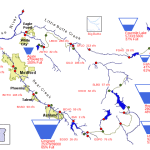Ashland must cut six full-time equivalent (FTE) jobs, put the brakes on Parks and Recreation Department expenditures, and reduce Ashland Fire and Rescue (AFR) overtime in order to (nearly) balance the 2019-2021 city budget, Mark Welch, director of Administrative Services, told an Ashland Citizens’ Budget Committee meeting last Wednesday, May 1 at City Hall.
City departments have submitted budgets which, when totaled, would create a deficit of $2,050,239 in the next biennium. Welch’s recommendations for expenditure reductions and revenue increases would put the deficit at $60,281.
Welch, who recently resigned, recommended reducing the optimal Fire Department staffing from nine to eight during late autumn, winter, and spring in order to increase staffing to 10 during fire season. He also suggested raising the public safety support fee to $5 a month or eliminating three fire fighters. Raising the AFR fee from $1.39 a month to $3 a month, increasing building fees, using the health benefits reserve, and retaining marijuana fees in the General Fund instead of supporting the Housing Trust Fund are on the table.
How can the city maintain the Parks budget without increasing property taxes? Welch asked. A department analysis of salaries found staff were underpaid, he said, with a $750,000 annual impact if that underpayment was rectified.
The proposed 2019-2021 Parks and Recreation budget of $14,244,000 is a 9% increase over the 2017-2019 budget of $12,996,185. The proposed budget recommends 3% higher across the board charges for services to partially offset this increase. Welch stressed that the department, under control of the five-person Parks Commission, operates under the Parks and Recreation Fund and is, to some extent, independent from the City of Ashland.
Michael Black, Parks and Recreation director, says his department has a $670,000 carry forward from the 2017-2019 budget.
“What is a healthy ending fund balance?” asked a committee member. “Twelve per cent for the General Fund and 12.5% for Parks,” Welch replied. Neither have this.
The Insurance Services Fund, responsible for all city premiums, currently has one full-time employee (FTE), whose work has been outsourced for a savings of $100,000, Welch said.
The Health Benefits Reserve Fund (HBF) no longer is self-funded, Welch said, and would face a 40% increase in costs if it were. “HBF will charge the departments for premiums and then pay CIS (the provider) through the fund.” Premium increases from fiscal year 2019 will average 6%, he said, but will be 10% for public safety employees, whose contracts have been grandfathered in. Although comparable cities pay 100% of their employees’ health insurance premiums, Ashland pays only 95%, Welch said. “The maximum cost to employees will be $4,750 a year,” he said. Premium rates from CIS will increase in January, 2020.
“The city should reconsider health benefits in union contracts,” committee member David Runkel said. “After the third (of four) year the city will revisit health benefits,” Welch replied. “Next budget, premiums for police and fire will decrease.”
Since the city will have an $882,000 reserve in the HBF, “Why is it not paying its $550,000 loan?” asked committee member Shaun Moran. “The General Fund was looking at a million dollar hit” when health services were self-funded, Welch said. “It looked like we were in a huge hole that we had to dig out of,” he said.
The Central Services Fund, which supports city departments that directly serve the public, is comprised of Administration, Administrative Services, City Recorder, Information Technology, and Public Works. “We must have a cost allocation plan to ensure fair and equitable sharing,” said Public Works Director Paula Brown. “The 2010 plan is outdated,” she said.
The General Fund covers public safety, parks, and the Community Development Department. Public safety is 76% of expenditures, with Fire and Rescue at 33% and the Police Department at 28%. Taxes cover 82% of these expenditures, with property taxes being 60% and the electric utility tax 25% (of residents’ electric bills). Southern Oregon University and city properties do not pay the utility tax, Welch said.
There should be no increase in property taxes, Welch said, leaving the city 4.5 cents of “wiggle room” unused. “In the last several years the city has experienced a 4% increase in property tax revenues,” Welch said.
The transient occupancy tax should go from 9% to 11%, he said. Growth will be an estimated 0% from July to September, 4% from October to April, and 2% in May and June.
“Are you looking for new ways to fund?” asked committee member Paula Hyatt. “The police chief has held off in hiring,” Welch replied. He said franchise fees will be set at 10% for city electricity, 8% for city water and wastewater, 2% for Ashland Home Net, 7% for Avista, and 5% for Charter.
“How are these rates determined?” asked Councilor Stephen Jensen. The non-city entities’ “sales don’t matter to us,” replied City Attorney David Lohman. “What matters is their cost to us.”
The public safety support fee would go from $1.50 to $6.50 a month, generating additional revenue of $840,000, Welch said. Beginning in the 2017-2019 budget biennium, this fee is being charged on all electric meters. It is a flexible fee and can be changed at any time, he said.
“Is there a way to charge some users more?” asked Councilor Dennis Slattery. “We could have lower rates for residential customers.”
The proposed budget eliminates six full-time employees—two from the Police Department, one from Community Development, one from Administration, one from Municipal Court, and one from Administrative Services.
“We will have trouble maintaining service levels,” remarked Mayor John Stromberg.
If the Fire Department changes ambulance billing for a savings of $40,000 and increases Medicare billing by $160,000, the net savings of $200,000 could be used to reduce the public safety fee from the proposed $6.50 a month to $3.30 a month, Welch said.
“Do you have other ideas of how to increase revenue?” Stromberg asked.
Welch’s proposals include increasing the food and beverage tax by 2% for revenue of $1,200,000, an operating levy of $.50 for revenue of $1,500,000, increasing the property tax to the maximum allowed 4.5 cents per $1000 for revenue of $150,000, increasing water and wastewater franchise fees for revenue of $300,000, installing parking meters for revenue of $60,000, and a live entertainment ticket tax generating an estimated $200,000 to $300,000.
At the beginning of the meeting, the microphone was open to citizen comments. George Allego, a retired firefighter with 28 years of experience, said “It’s important to maintain staffing. Safety is the (city’s) most important task.”
Larry Cooper said the $1.5 million allocated for refurbishing the Japanese Garden could be obtained from gifts and grants. “That change will require $100,000 a year in specialized maintenance,” he said, adding that no provision has been made for future budgets to include this expense. “Raising fees is not sustainable,” he said.
Regina Ayers said the Housing Trust Fund (HTF) was initially funded by marijuana revenue, but moving this money to the General Fund has shut off the revenue stream. “The HTF is used for pre-development funds for non-profits,” she said. “Twenty-four units of affordable housing for the mentally challenged were approved in 2018. Let’s not stop the momentum. We have to have our citizens housed.”
Addie Greene
Ashland








